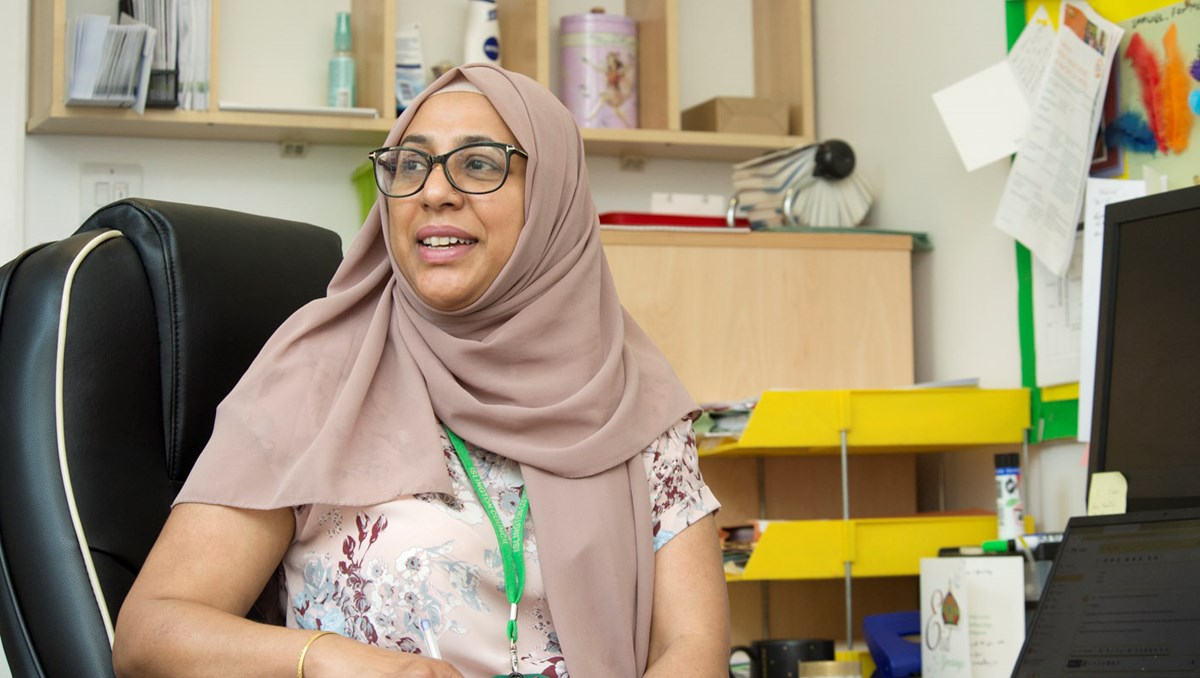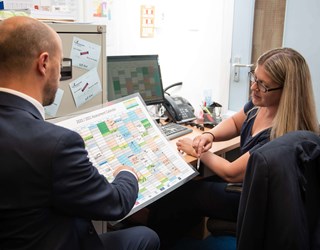Researching the wellbeing of School Business Leaders
Gemma Scotcher, Director of Communications at Education Support talks about partnering with Education Mutual to research the wellbeing of School Business Managers.
Articles

It’s no secret that school communities are under more pressure than ever. Children arrive at school each day with more complex needs than ever. Stretched public services make it harder for school staff to provide the support that’s required, often taking home thoughts and worries about the working day.
If you work in a school, you’re likely taking on more and more and responsibility. It may feel like your job role is gradually expanding.
If this resonates with you, we want you to know that we see you. We understand how challenging it is, and we’re so thankful that the education system has dedicated and talented staff who keep working to guide and inspire our next generation of adults.
We know that our colleagues at Education Mutual feel the same. That’s why we were so keen to work with them to research the experiences of School Business Leaders, School Business Managers, HR and admin staff – and everyone else who keeps schools running from behind the scenes.
Education Mutual and Education Support have worked together on brand new research which we hope will improve our collective understanding of the role of SBLs working in state-funded primary, secondary and special schools in England and Wales.
So what did our research find?
The good news is that most SBLs feel that their schools do support their staff well with their mental health and wellbeing. It is heartening to know that, despite the systemic drivers of stress, many schools and leaders are choosing to make staff wellbeing a priority. We hope that having access to services such as those available from Education Support and Education Mutual play a role in this.
Workload is a challenge, with many SBLs struggling to switch off in the evenings. One SBL told us that they regularly have to drop everything on their to-do list and focus on ad hoc immediate requests, saying “it is just constant”.
It’s great to develop an evidence base around these points which we had already heard anecdotally. The finding we found most striking, however, was the lack of understanding from colleagues about what the SBL role actually entails. Many SBLs felt that their role was complex and solitary and not well understood by their colleagues leaving them feeling isolated.
“The workload here links to a lack of understanding about the role. No-one has any idea how long things take. Everyone passes work to me and thinks, ‘it’s okay the business manager can do that she will deal with it’” said one SBL from a special school.
Connection and appreciation are well-evidenced sources of positive wellbeing in the workplace. Quality relationships where we feel seen, heard, supported and understood are essential antidotes to stress and pressure - which is why this finding is so important.
So what can we do?
If you’re an SBL reading this, I invite you share the report with your Headteacher. Flag the finding about a lack of understanding about your role. What can you and your Head do to ensure your colleagues really understand what your role involves? How can colleagues better understand what’s appropriate to ask you to do, and what isn’t? How can you and your Head better communicate the complexity of all that you do?
And if you are a headteacher or school leader, when was the last time you checked-in with your SBL? Maybe you can ask them if this finding resonates with their experience, and work on a plan of action to improve understanding of the SBL role among your staff team.
SBLs help to create the right conditions for leaders and teaching staff to focus on pupils’ needs, and we hope these findings go some way towards helping leaders to retain committed and talented SBLs, SBMs, HR and admins staff – all of whom play a vital role in ensuring our next generation of adults can meet their fullest potential.
Further recommendations from the report include:
For SBLs
Can you approach a colleague or senior leader within your school or academy trust to informally share ideas or opinions with?
They may not be SBLs but they understand the school’s culture and challenges. It might help combat any isolation in your role.
Can you join local or national groups and support networks of SBLs, where experiences can be shared and issues discussed?
Perhaps your Local Authority or MAT chain runs one? If they do not exist, maybe you can start one? Even a WhatsApp group of a few local SBLs could be an incredibly helpful resource.
Consider how you can foster better understanding of your role among your colleagues
One example of this from the interviews was: “I did do some work for a trust CPD day to try [to] help everyone understand what the central team does. That was really powerful, a lot of people came back and said, ‘Oh, I had no idea you were that busy’” (Mixed MAT, West Midlands)
Think about your own mental and physical health and the ways in which this could be improved
It is all too easy to forget about your own needs when in a busy role helping others – it must be an equal priority. We have published three resources which you may find helpful.
For senior leaders
Use this report to start a conversation with your SBLs
Do our findings chime with their experience? How can they best be supported?
Improve awareness of the SBL role to staff working at all levels
This will lead to better understanding and appreciation of what the role involves.
Consider how you can offer all staff access to wellbeing services
Signpost to relevant sources, in order to combat the isolation felt by many SBLs.
Encourage external networking with others in similar roles
Signpost to relevant sources, in order to combat the isolation felt by many SBLs.
Reassure all staff that wellbeing services are confidential
They are safe to use and there shouldn't be any fear of potential consequences.
Our service provides emotional and practical support that helps you and your colleagues thrive at work.

Fully funded professional supervision for school and FE college leaders in England and Wales.





















